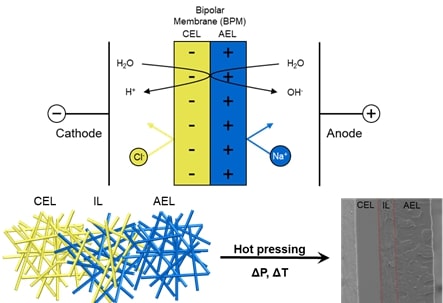Lactic acid (LA) is a important material that has major applications in the food industry, pharmaceuticals and cosmetics. Moreover, polylactic acid (PLA) has gained worldwide attention due to its desirable bio-degradable properties, which increases the demand for LA even more. LA is often produced by fermentation processes, but during conventional fermentation especially calcium lactate salts are produced instead of LA. Acidifying the calcium salt, generally done with H2SO4, is required to convert the salt back to the acid (LA). However, during acidification calcium sulphate (gypsum) is formed as a by-product thus causing high amounts of waste. Therefore, the recovery of the LA without waste generation is an important factor in the economic feasibility and sustainability of the fermentative LA production process.
Electrodialysis with bipolar membranes (EDBM) has the potential to convert lactate salts into LA without the introduction of other chemical reagents. Water dissociation occurs inside the bipolar membrane (if sufficient potential is applied) at the interface of the anion-exchange layer (AEL) and cation-exchange layer (CEL) resulting in the generation of H+ and OH- ions. Therefore, these bipolar membranes can be used to produce organic acids (LA) from dilute salt solutions. Tailoring the interface of the bipolar membranes (BPM) is very important to promote high water dissociation rates. Electrospinning is a versatile technique that allows more control over the BPM interface thickness, morphology and composition compared to conventional casting techniques. In this work electrospinning is used to tailor the interface of the BPM to increase the current efficiency for water dissociation. Moreover, water dissociation catalysts are introduced in the electrospun BPM interface by a layer-by-layer modification with polyelectrolytes. Finally, these novel BPMs are used in a electrodialysis process to investigate the production of LA from lactate salts. Different EDBM stack configurations and feed solutions are used to study their effect on the production of LA and the purity of the product streams.

Contact details

Name: Menno Houben
Country of origin: The Netherlands
Room: STO 0.49
Email: m.houben@tue.nl
TU/e phone: 4646